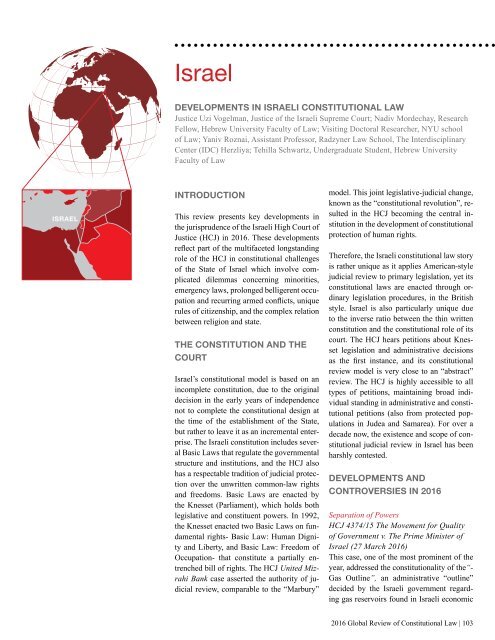2016 Global Review of Constitutional Law
I-CONnect–Clough Center collaboration.
I-CONnect–Clough Center collaboration.
Create successful ePaper yourself
Turn your PDF publications into a flip-book with our unique Google optimized e-Paper software.
Israel<br />
DEVELOPMENTS IN ISRAELI CONSTITUTIONAL LAW<br />
Justice Uzi Vogelman, Justice <strong>of</strong> the Israeli Supreme Court; Nadiv Mordechay, Research<br />
Fellow, Hebrew University Faculty <strong>of</strong> <strong>Law</strong>; Visiting Doctoral Researcher, NYU school<br />
<strong>of</strong> <strong>Law</strong>; Yaniv Roznai, Assistant Pr<strong>of</strong>essor, Radzyner <strong>Law</strong> School, The Interdisciplinary<br />
Center (IDC) Herzliya; Tehilla Schwartz, Undergraduate Student, Hebrew University<br />
Faculty <strong>of</strong> <strong>Law</strong><br />
ISRAEL<br />
INTRODUCTION<br />
This review presents key developments in<br />
the jurisprudence <strong>of</strong> the Israeli High Court <strong>of</strong><br />
Justice (HCJ) in <strong>2016</strong>. These developments<br />
reflect part <strong>of</strong> the multifaceted longstanding<br />
role <strong>of</strong> the HCJ in constitutional challenges<br />
<strong>of</strong> the State <strong>of</strong> Israel which involve complicated<br />
dilemmas concerning minorities,<br />
emergency laws, prolonged belligerent occupation<br />
and recurring armed conflicts, unique<br />
rules <strong>of</strong> citizenship, and the complex relation<br />
between religion and state.<br />
THE CONSTITUTION AND THE<br />
COURT<br />
Israel’s constitutional model is based on an<br />
incomplete constitution, due to the original<br />
decision in the early years <strong>of</strong> independence<br />
not to complete the constitutional design at<br />
the time <strong>of</strong> the establishment <strong>of</strong> the State,<br />
but rather to leave it as an incremental enterprise.<br />
The Israeli constitution includes several<br />
Basic <strong>Law</strong>s that regulate the governmental<br />
structure and institutions, and the HCJ also<br />
has a respectable tradition <strong>of</strong> judicial protection<br />
over the unwritten common-law rights<br />
and freedoms. Basic <strong>Law</strong>s are enacted by<br />
the Knesset (Parliament), which holds both<br />
legislative and constituent powers. In 1992,<br />
the Knesset enacted two Basic <strong>Law</strong>s on fundamental<br />
rights- Basic <strong>Law</strong>: Human Dignity<br />
and Liberty, and Basic <strong>Law</strong>: Freedom <strong>of</strong><br />
Occupation- that constitute a partially entrenched<br />
bill <strong>of</strong> rights. The HCJ United Mizrahi<br />
Bank case asserted the authority <strong>of</strong> judicial<br />
review, comparable to the “Marbury”<br />
model. This joint legislative-judicial change,<br />
known as the “constitutional revolution”, resulted<br />
in the HCJ becoming the central institution<br />
in the development <strong>of</strong> constitutional<br />
protection <strong>of</strong> human rights.<br />
Therefore, the Israeli constitutional law story<br />
is rather unique as it applies American-style<br />
judicial review to primary legislation, yet its<br />
constitutional laws are enacted through ordinary<br />
legislation procedures, in the British<br />
style. Israel is also particularly unique due<br />
to the inverse ratio between the thin written<br />
constitution and the constitutional role <strong>of</strong> its<br />
court. The HCJ hears petitions about Knesset<br />
legislation and administrative decisions<br />
as the first instance, and its constitutional<br />
review model is very close to an “abstract”<br />
review. The HCJ is highly accessible to all<br />
types <strong>of</strong> petitions, maintaining broad individual<br />
standing in administrative and constitutional<br />
petitions (also from protected populations<br />
in Judea and Samarea). For over a<br />
decade now, the existence and scope <strong>of</strong> constitutional<br />
judicial review in Israel has been<br />
harshly contested.<br />
DEVELOPMENTS AND<br />
CONTROVERSIES IN <strong>2016</strong><br />
Separation <strong>of</strong> Powers<br />
HCJ 4374/15 The Movement for Quality<br />
<strong>of</strong> Government v. The Prime Minister <strong>of</strong><br />
Israel (27 March <strong>2016</strong>)<br />
This case, one <strong>of</strong> the most prominent <strong>of</strong> the<br />
year, addressed the constitutionality <strong>of</strong> the“-<br />
Gas Outline”, an administrative “outline”<br />
decided by the Israeli government regarding<br />
gas reservoirs found in Israeli economic<br />
<strong>2016</strong> <strong>Global</strong> <strong>Review</strong> <strong>of</strong> <strong>Constitutional</strong> <strong>Law</strong> | 103


